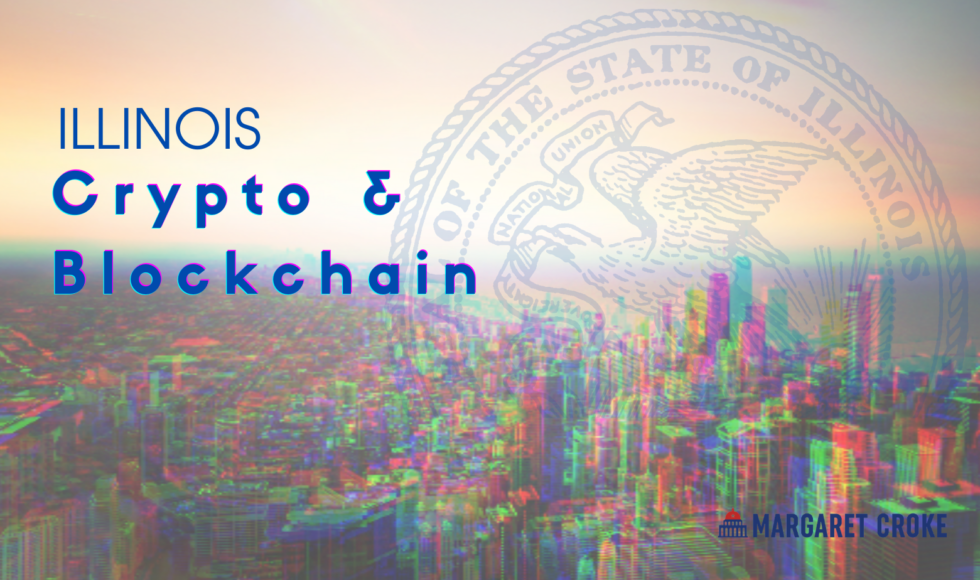HB3968 creates a Special Purpose Trust Company making digital assets a part of Illinois’ financial services future. It will create a stable regulatory environment where businesses in Illinois have the ability to bank digital assets. The bill passed the Illinois House unanimously, bringing Illinois one step closer to being the national leader in fintech.
Cryptocurrency can seem very complicated and overwhelming. Let’s address some of the questions related to my bill together.
For a full 101 on cryptocurrency, check out: https://www.forbes.com/advisor/investing/what-is-cryptocurrency/
Why Illinois?
Illinois has a special draw — we have a strong existing financial service industry and world-class talent — but too often we’re playing second fiddle to New York City and Los Angeles.
Why now?
Currently, companies engaged in crypto-assets find it very difficult to access traditional banking services, and if they can find one, the associated costs are sky-high. They need a regulatory landscape to be able to grow and thrive. Illinois cannot squander the opportunity to become a leader in this industry before other likely competitors like New York, California, and Florida get there as well. Other states are already starting conversations on legislation to attract this type of business, but they aren’t as far along or well-positioned as Illinois is, and that’s why the timing is so important.
Isn’t cryptocurrency very volatile, and therefore dangerous?
Cryptocurrency may feel volatile to Americans, but compared to many other countries across the world that have much more volatile currencies, it can actually be more stable. For example, we’ve seen countries’ inflation rates skyrocket overnight leaving their fiat currencies worthless. Even worse, authoritarian governments can seize a person’s life savings without fear of recourse. That’s why countries in Europe are more comfortable with cryptocurrency, and why if we pass this bill in Illinois, we can be competing on an international level.
What types of businesses use cryptocurrency?
Cryptocurrency is predominately used by the financial services industry. However, the possibilities are endless. I anticipate that in the next decade we will see many different types of businesses taking advantage of crypto.
Isn’t cryptocurrency used for illegal and nefarious activities?
Crypto-currency has grown immensely from the oddity it was back in 2008 to a legitimate asset today used by legitimate companies that have been created to work in this space. Access to traditional banking services under traditional regulations like the ones proposed in this bill would add a layer to oversight designed to protect consumers and businesses from money laundering and other nefarious activities.
Are there any equity components to this bill?
Cryptocurrency is built off the idea that people who have typically been unable to access financial institutions for a number of reasons — lack of citizenship, overdraft fees, etc — are able to access cryptocurrency, creating a more equitable system for people who are typically left out of traditional financial institutions can be a part of. By permitting our banking institutions to accept and utilize cryptocurrency, Illinois has the opportunity to support a financial innovation that can include far more of its residents into the financial system and provide more equitable access to capital.
Why do you believe this bill will create economic growth?
The global cryptocurrency market is over $2 trillion. Additionally, the number of startups being funded in this space continues to grow exponentially. In Q1 2021 alone, 129 crypto and blockchain startups received about $2.6 billion in funding. This figure is already $300 million more than the total funding for such companies in the whole of 2020 — a year when cryptocurrency firms added over 8,000 jobs. But perhaps more important than the rapid growth of cryptocurrency and blockchain itself is its effect on traditional industries in manufacturing, transportation, and agriculture – industries of tremendous importance to Illinois. The investment firm Outlier Ventures determined that the economic value of blockchain applied to these industries is $2-$3 trillion. This bill is the first step in unlocking Illinois’s leadership in the digital asset space. With continued momentum, we can see digital assets and blockchain improve not just financial services but other industries in Illinois, growing companies and jobs.
How would this bill impact the US Dollar economy?
There would be no impact on the US dollar economy because of this bill.
What will the charter process look like?
The charter process will be very similar to the existing trust charter process in Illinois. There will be a pre-filing period where IDFPR discusses the process with the prospective charter, a formal application process where the de novo raises capital, hires directors, and puts forth their business plan, and a charter establishing process where IDFPR signs off on applications that meet the needs of an Illinois Special Trust.
Is there a cost to the state?
No, this is a revenue-positive proposal.
Are there any cybersecurity requirements?
New charters will have the same requirements as all other banking institutions in the State of Illinois. IDFPR would focus on making sure these entities are taking the proper steps to protect against cyberattacks, like existing state banks currently do.
I’m excited for the future of HB3968 and the future of cryptocurrency in Illinois. If you have any questions, please reach out to my office at info@repcroke.com.


